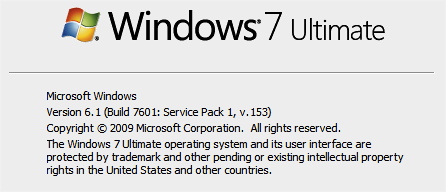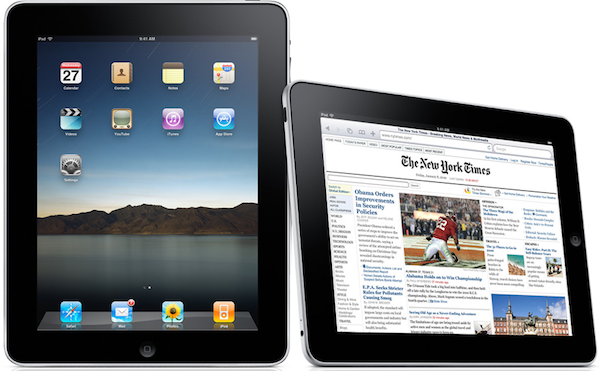
7 people who are returning their iPads
You could be among them, but don't delay.
Months of hype built up your expectations -- like one of those Internet romances. There's what you imagined the iPad to be, and now there is the reality. Can you annul this sorry relationship? Yes, within 14 days of purchase and by coughing up a 10-percent restocking fee.

Skyfire: BlackBerry development just not as good as Android
Popular third party mobile Web browser Skyfire posted an announcement last week that it would be opening up alpha testing for its forthcoming Webkit-based Android browser. Within one hour of making the announcement, over 3,000 people contacted Skyfire to get in on the test. The alpha team, unfortunately, is only going to be 30 testers.
So today, Skyfire's Jeff Glueck addressed the undoubtedly huge interest swelling around the new Skyfire product, and talked about why Android development has superseded development on the BlackBerry platform.

Windows 7 SP1 leaks, downloadable now
In March, the Windows team announced the upcoming release of Service Pack 1 for Windows 7, and Windows Server 2008 R2, but did not set a date of availability.
At the time, Microsoft's Brandon LeBlanc said, "For Windows 7, SP1 includes only minor updates, among which are previous updates that are already delivered through Windows Update. SP1 for Windows 7 will, however, deliver an updated Remote Desktop client that takes advantage of RemoteFX introduced in the server-side with SP1 for Windows Server 2008 R2."

Dropico lets you drag and drop photos between sites
Dropico is a new rich Web application that lets users manage their photo albums from Facebook, Twitter, Picasa, Flickr, Photobucket, Myspace, and Bebo all in one central location with a simple drag and drop interface.
Users pair their accounts from those sites with Dropico, and then they can pull photos off of one site, edit them, and pipe them down to another site quickly and easily. Additionally, users can pull photos from their friends or favorite profiles and move them to other sites. For example, if you follow the Library of Congress' Flickr stream and you discover something that you really like, you can drag it from the Flickr window over to the Twitter window and post it to your Twitter feed via yfrog, twitgoo, or twitpic.

UK ad board says Motorola Dext isn't the 'first phone with social skills'
The UK's Advertising Standards Authority (ASA) frequently cracks down on advertisements from consumer technology companies, asking companies to fix commercial claims that are confusing or misleading.
In 2008, the ASA requested that Apple remove or change iPhone 3G television advertisements because their claims that the device was "really fast" were exaggerated and misleading.

iPad Wi-Fi complaints echo those of Nexus One, iPod Touch
Since Apple's iPad launch just over two days ago, frustrated users have packed Apple's iPad support forum with complaints of weak and unreliable Wi-Fi connections. The problem has even affected two Betanews staffers who got iPads on the device's launch day.
Some users have speculated that Wi-Fi issues are related to chassis shielding, antenna placement, or software problems, but there has not yet been any concrete evidence to support any of those guesses.

Should Microsoft franchise its retail stores?
If you believe Mid-March job postings, Microsoft is preparing to launch two new retail stores, in Denver and San Diego, bringing the count to four. That's not exactly rapid expansion, given two other stores opened in October -- Mission Viejo, Calif. and Scottsdale, Arizona. Microsoft has to move more aggressively into retail, if it's going to rebuild its brand image and establish an appealing digital lifestyle for the twenty-tens.
The company has an image problem that smart marketing and savvy retailing can repair. Yesterday, at MSNBC, Bill Briggs called Apple "fresh" and Microsoft "frumpy". The nut graph: "Microsoft, to some, appears a tad flabby in the middle -- a Chrysler Town & Country driver with a 9 p.m. bedtime. Apple, in some eyes, looks sleeker and younger -- a hipster in ragtop Beemer packed with chic friends sporting mobile toys."

Hey, Apple, Microsoft, mobile multitasking is a necessity
Apple's "Get a sneak peak into the future of iPhone OS" event, in two days, is reason enough to re-raise the thorny topic of multitasking on smartphones. Apple's iPhone OS 3.x -- on iPad, iPhone and iPod touch -- limits running background applications. Microsoft is taking a similar approach with Windows Phone 7 (Thank God, the company dropped "Series" from the name).
Here's where I whack aside the head my former analyst colleague, Michael Gartenberg -- or you can whack me (in comments) if you agree with him. Gartenberg and I are polarized on the topic of mobile multitasking. He thinks it's unnecessary, I say it's a necessity. In March 25 post "Windows Phone 7 Series imitates Apple's iPhone in the worst ways," I asserted: "People take multitasking for granted on the PC, which will make its absence more noticeable on the smartphone." I'd argue that because of applications' or features' contextual appeal, running background applications will increase in appeal over time. There are reasons why Google, Nokia or Palm operating systems allow multitasking, and seem to do so without any major hit on battery life (I've tested Android, Maemo and Symbian devices, but not WebOS).

First look: Rhapsody for Android (beta)
Since Rhapsody has spun off from RealNetworks and Viacom/MTV, the subscription music service has gone down in price from $14.99 to $9.99, and its first app for Android has been released.
The service has thus far proven to be extremely popular on the iPhone/iPod touch, and has been downloaded more than 1.5 million times since debuting just about eight months ago. That application lets subscribers access Rhapsody's 8 million song database for streaming over 3G or Wi-Fi connections, they can make their own playlists or listen to commercial-free Rhapsody Radio programming.

Court rules that FCC can't stop Comcast from throttling traffic
In August 2008, the Federal Communications Commission issued a cease and desist order to cable company Comcast, demanding it stop throttling BitTorrent traffic. It was considered the first citation ever for the violation of net neutrality rules.
Comcast then filed suit against the FCC, contesting that the Commission overstepped its boundaries because net neutrality guidelines were not a law. They're not.

Xbox 360 system update finally adds USB storage
As expected, Microsoft has pushed out a mandatory update to the Xbox 360 today, which adds support for USB storage devices, expanding the memory capacity of the five-year old video game console.
The update will ostensibly allow any FAT32-formatted USB storage device between 1GB-16GB in size to be used to save profiles, game saves, and downloadable content. There are, however, a number of caveats, which mean users can't just plug anything in and have it work.

A bill too far: With iPad, AT&T attempts a triple-dip
Do you ever get the impression your wallet is being relentlessly sucked dry? Or that consumers are being expected to pay for an ever growing list of subscription-based services that, in a less profit-mad world, would likely be free?
Apple's gotten quite enough publicity from me and my colleagues over the last little while. So while I hate to harp on the iPad yet again this week, I can't let go of the fact that this particular introduction represents yet another step toward the deepening fiscal enslavement of consumers.

Live TV on the iPad coming soon
Qualcomm's mobile broadcast television service called FLO TV existed for about five years under different wireless carrier brand names: Sprint TV, Verizon V Cast TV, and AT&T MediaFLO TV. But the carriers didn't push it very hard, so it did not break through into the public's consciousness.
But then Qualcomm began advertising FLO TV on its own, with its own smartphone-sized pocket TVs made by HTC, and it looks like it is finally beginning to stick.

Is iPad really just a proof-of-concept device?
Today, Apple announced modest launch-day iPad sales of 300,000 units, which include preorders. On March 26, in post "Of course media bias favors Apple," I put launch sales at about 330,000 -- based in part on over-widely reported rumors. Five days earlier, in post "Be smart, don't buy into iPad hype," I warned that bloggers, journalists and Wall Street analysts had gone bonkers over the device, losing some common sense along the way. Piper Jaffray analyst Gene Munster is among them. Over the weekend, he revised first day iPad sales to 600,000-700,000, leading to today's admission he got it wrong. Munster also lowered full year sales estimates to 4.3 million from 5.6 million. Forrester Research forecasts 3 million iPad shipments.
Modest initial sales aren't surprising, even though some Apple watchers will wonder if 300,000 units live up to the hype. As I explained on April 2, modest early sales follow the pattern of most other new-category Apple products, including Macintosh, iPhone, iPod and iTunes Store. Distribution is limited to the United States and the 3G model isn't yet available, which also mitigate early sales.

Second site: Making the Web more accessible to the visually impaired
As the population ages, financial institutions and other service providers will have to learn to adapt their marketing approaches to appeal to a sector that has high disposable income and substantial spending power. In some cases, they will also have physical limitations that will impede online activities, including vision loss.
Besides the fact that an aging population brings with it a growing number of people with vision loss, the business and legal case for making Web content accessible to the visually impaired is becoming increasingly strong.



